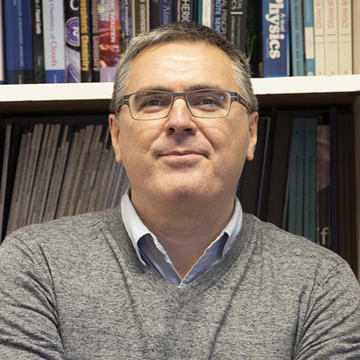Grant Ritchie

Professor Grant Ritchie
Professor of Chemistry
My research concerns laser spectroscopy and its use in analytical chemistry and in studies of gas phase kinetics and dynamics. The research is characterised by novel technique and instrument development which not only allows innovative studies of chemical kinetics, dynamics and photon science, but that can also be translated into the real world. Particular areas of interest are healthcare and medicine, plasmas diagnostics and atmospheric chemistry.
Healthcare and medicine
Our group, in collaboration with colleagues in the Department of Physiology and Genetics, has developed a novel highly precise real-time breath analyser, termed a molecular flow sensor (MFS). The MFS uses diode laser absorption within an optical cavity in combination with a custom flow meter and allows the absolute number of O2, CO2 and H2O entering and leaving the lungs to be calculated as a function of time. These molecular flows are combined with new mathematical models of lung, circulatory system and body gas stores to allow direct, non-invasive and quantitative measurements of such medically important parameters as lung inhomogeneity (what proportion of the lung is acting “normally”), and oxygen uptake (how well the body is using the oxygen that is being supplied from the lungs).
The MFS is small enough to fit as an attachment to a standard ventilation tube, and has been used in both normally breathing subjects and anaesthetised patients in an operating theatre. It has also been adapted to measure other gases simultaneously: for example the uptake of very low concentrations of inspired acetylene and methane has been measured to quantify cardiac output, the rate at which blood flows around the body, and the time dependence of expiration of nitric oxide to allow the site of production of this inflammation marker to be determined.
The MFS is at the core of new innovative techniques for making highly-precise, non-invasive measurements of cardiorespiratory function and which are being successfully integrated as research tools into a number of clinical pathways in respiratory medicine including asthma, cystic fibrosis and COPD. The technology is also being used in the national PHOSP-COVID study to test the hypothesis that “long COVID” may involve a breakdown of the normal mechanism of diverting blood away from damaged parts of the lung.
Plasma diagnostics
Measurements of the absolute concentrations of trace gas species in plasmas are vital for understanding and directing research in this applied area. Diode laser spectroscopy is sufficiently sensitive to measure physico-chemical properties such as the absolute number densities, translational & internal temperatures, field effects and the electron energy distribution as a function of the plasma operating conditions. Of particular interest are low pressure molecular plasmas (O2, N2 etc.) which are important in semi-conductor processing, and cold atmospheric pressure plasmas (CAPs) which are efficient sources of reactive oxygen and nitrogen species (RONS), many of which are also produced naturally in cells and can regulate cellular and physiological processes. As such CAPs are finding an increasing number of medical applications and when applied to living tissue, they can destroy, or at least significantly reduce the size of, cancerous tumours. Ongoing research seeks to quantify the fluxes of primary and secondary RONS with a view to improving our understanding of plasma enhanced medicine.
Atmospheric chemistry
In order to fully understand the chemistry occurring in our atmosphere it is necessary to measure the absolute concentrations of trace radical species both accurately and quickly. Cavity enhanced spectroscopies provide a robust, sensitive and accurate method for making quantitative measurements of such species. Ongoing research is focussing upon developing methods to detect HO2 and RO2 radicals. Furthermore, we use time-resolved FTIR emission spectroscopy to study the oxidation mechanisms of simple biofuels.
Associated research themes:
Grant Ritchie is a professor of Chemistry and was Head of the Physical and Theoretical Chemistry (PTC) section in Oxford from 2020-2025. Before that he was Director of Graduate studies for 5 years from 2015-2020. He leads a group that develops innovative techniques for trace gas detection with applications ranging from fundamental studies of gas phase chemical dynamics to plasma medicine and breath analysis. Part of his research involves translation of these methods into the real world and he works in close collaboration with scientists and engineers in both academic and industrial laboratories, and with physiologists and clinicians both internal and external to the University.
Grant was appointed to a lectureship in physical chemistry at the University of Oxford in 2006 alongside a tutorial fellowship at Worcester College. Prior to that date he had held several prestigious fellowships: a Ramsay Memorial Research Fellowship (2000 – 2003), a Junior Research Fellowship at St. John’s College (2000 – 2004), and a Royal Society University Research Fellowship (2000 – 2009). He obtained his BA and DPhil from Trinity College Oxford, the latter supervised by Gus Hancock in the area of chemical reaction dynamics. He is currently a member of the NERC peer review college and has authored the text books Atmospheric Chemistry - From the Surface to the Stratosphere (Wiley 2017) and Foundations of Physics for Chemists (OUP 2000).




